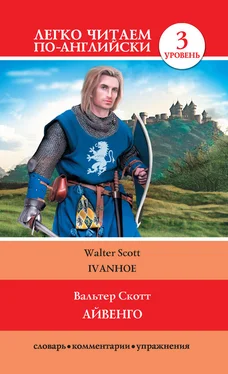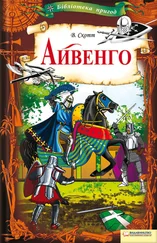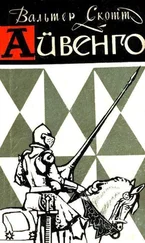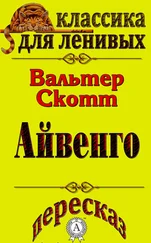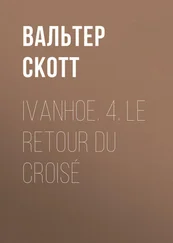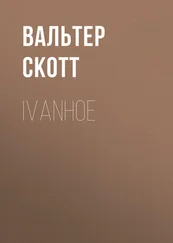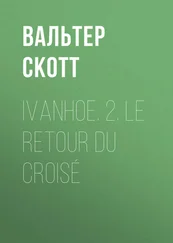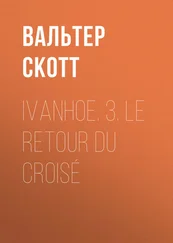Rebecca was indeed very beautiful. Her turban of yellow silk suited well with her dark face. The brilliancy of her eyes, the arch of her eyebrows, her elegant aquiline nose, her teeth as white as pearls, and her black hair – all these made her look lovely.
“Who is she, Isaac? Your wife or your daughter?” asked Prince John.
“My daughter Rebecca, your Grace,” answered Isaac, with a low bow.
“Daughter or wife, she should be given place according to her beauty and your wealth. Who sits above there?” he continued, looking at the gallery. “Saxon fools! Let them sit close, and make room for my prince of usurers [16]and his lovely daughter.”
The Saxons who occupied the gallery were the family of Cedric the Saxon with his friend Athelstane of Coningsburgh, who was very much respected by all the Saxons of the north of England due to his descent from the last Saxon monarchs of England. But his royal blood brought to Athelstane many defects of his ancestors. He was strong and good-looking, but inactive and so slow in making decisions, that he was generally called Athelstane the Unready.
It was this person that the Prince commanded to make place for Isaac and Rebecca. Athelstane was offended and was not going to obey, but he didn’t know how to react to this command, so he just sat there, staring at the Prince with an astonishment which was even funny. But Prince John didn’t think it was so.
“The Saxon is either asleep or doesn’t pay attention to me. Wake him up with your lance, De Bracy,” he said to a knight who rode near him, the leader of a band of mercenaries. Even the followers of Prince John did not think it was a good idea, but De Bracy extended his long lance over the space which separated the gallery from the lists. The Athelstane was not ready for this, but Cedric quickly took out his short sword and cut off the head of the lance with one blow. The Prince was very angry, but he was stopped from threatening Cedric by his own followers, who gathered around him asking him to be patient. The crowd answered in loud applause to the bold action of Cedric.
The Prince was looking for a safe and easy victim for his anger, when he noticed some archer who continued to clasp hands even when he saw the frowning face of the Prince. John asked why he was clasping.
“I always clasp,” said the yeoman, “when I see a good shot or an elegant blow.”
“Then you can hit the mark yourself, I hope,” said the Prince.
“An archer’s mark, and at archer’s distance, I can hit,” answered the yeoman.
“We will try your skill!”
“I will not run from the trial,” said the yeoman calmly.
“Now, stand up, you Saxons,” said the angry Prince, “because, since I have said it, the Jew will have his seat among you!”
“By no means, your Grace! [17]—it is not fit for us to sit with the rulers of the land,” said the Jew.
“Go up, dog, when I command you,” said Prince John, “or I will have your skin taken off and used for decoration.”
After this command the Jew began to climb the stairs which led up to the gallery.
“Let me see who will stop him”, said the Prince fixing his eye on Cedric, who seemed ready to throw the Jew down head first.
The catastrophe was prevented by the clown Wamba. He stood up between his master and Isaac and put before the face of the Jew a piece of salted pork which he was keeping beneath his cloak in case the tournament was too long. When the Jew saw pork right before his nose, he took a step back, stumbled, and rolled down the steps, – to the amusement of everybody around, including Prince John and his followers.
“Give me some prize, Prince,” said Wamba, “I have defeated my enemy in fair fight with my sword,” he added, showing the piece of pork.
“Who are you, noble champion?” said Prince John, still laughing.
“A fool by right of descent,” answered the Jester, “I am Wamba, the son of Witless.”
“Make room for the Jew in the lower row,” said Prince John, “it is not right to place the defeated next to the victor. Here, Isaac, lend me some money.”
Since the Jew was slow to obey his command, the Prince took his purse, threw to Wamba a couple of the gold coins which it contained, and continued his career round the lists, leaving the Jew to the laughter of those around him, and himself receiving as much applause from the spectators as if he had done something honest and honourable.

* * *
Soon the tournament began. The barriers were opened, and five knights rode slowly into the lists. All five were splendidly armed. The champions rode through the lists to the other end. As the procession entered the lists, the sound of a wild Barbaric music was heard from behind the tents of the challengers, where the performers were concealed. The music was of Eastern origin and seemed at once to bid welcome and to pronounce challenge to the knights as they advanced. The five knights came to the tents of the challengers, and there each touched slightly, and with the reverse of his lance, the shield of the antagonist whom he wished to oppose. This showed that they didn’t want to fight to the death.
The challengers mounted their horses, and, headed by Brian de Bois-Guilbert rode into the lists and opposed themselves individually to the knights who had touched their shields.
At the sound of trumpets, they started out against each other at full gallop, and such was the superior skill or good fortune of the challengers, that those opposed to Bois-Guilbert, Malvoisin, and Front-de-Boeuf rolled on the ground. Only one knight maintained the honour of his party, and parted equally with the Knight of St John, both breaking their lances without advantage on either side.
The shouts of the crowd announced the triumph of the challengers.
A second and a third party of knights took the field, but still the challengers won. Not one of them lost his seat or missed his target. After the fourth party there was a long pause. The spectators were not very satisfied, because Malvoisin and Front-de-Boeuf were unpopular for their characters.
Prince John began to talk to his followers about making ready the banquet and giving the prize to Brian de Bois-Guilbert, who had, with a single spear, overthrown two knights, and defeated a third.
After some time, when the Eastern music of the challengers sounded again, it was answered by a solitary trumpet. All eyes turned to see the new champion which these sounds announced. On his shield there was a young oak-tree pulled up by the roots, with the word Disinherited. He rode a good black horse, and as he passed through the lists he gracefully saluted the Prince and the ladies by lowering his lance. The skill with which he managed his horse, and something of youthful grace which he showed in his manner, won him the favour of the spectators, which some of the simple people expressed by calling out, “Touch the Hospitaller’s shield, he is the weakest.”
The champion however rode straight to the central tent and struck with the sharp end of his spear the shield of Brian de Bois-Guilbert. All stood astonished at his bravery, but none more than Bois-Guilbert himself, who did not expect challenge to mortal combat and was standing carelessly at the entrance of his tent.
“Have you been to church this morning, brother,” said the Templar, “and have you gone to confession, that you put your life in such danger?”
“I am fitter to meet death than you are,” answered the Disinherited Knight.
“Then take your place in the lists,” said Bois-Guilbert, “and look for the last time upon the sun. This night you will sleep in paradise.”
Читать дальше
Конец ознакомительного отрывка
Купить книгу
